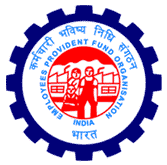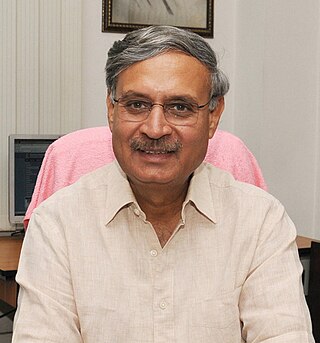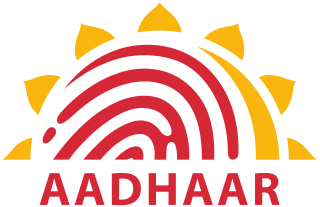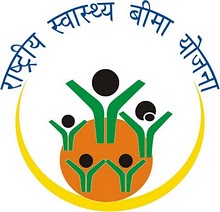Related Research Articles

The Employees' Provident Fund Organisation (EPFO) is one of the two main social security organization under the Government of India's Ministry of Labour and Employment and is responsible for regulation and management of provident funds in India, the other being Employees' State Insurance. The EPFO administers the retirement plan for employees in India, which comprises the mandatory provident fund, a basic pension scheme and a disability/death insurance scheme. It also manages social security agreements with other countries. International workers are covered under EPFO plans in countries where bilateral agreements have been signed. As of May 2021, 19 such agreements are in place. The EPFO's top decision-making body is the Central Board of Trustees (CBT), a statutory body established by the Employees' Provident Fund and Miscellaneous Provisions (EPF&MP) Act, 1952. As of 2021, more than ₹15.6 lakh crore are under EPFO management.
India has a robust social security legislative framework governing social security, encompassing multiple labour laws and regulations. These laws govern various aspects of social security, particularly focusing on the welfare of the workforce. The primary objective of these measures is to foster sound industrial relations, cultivate a high-quality work environment, ensure legislative compliance, and mitigate risks such as accidents and health concerns. Moreover, social security initiatives aim to safeguard against social risks such as retirement, maternity, healthcare and unemployment while tax-funded social assistance aims to reduce inequalities and poverty. The Directive Principles of State Policy, enshrined in Part IV of the Indian Constitution reflects that India is a welfare state. Food security to all Indians are guaranteed under the National Food Security Act, 2013 where the government provides highly subsidised food grains or a food security allowance to economically vulnerable people. The system has since been universalised with the passing of The Code on Social Security, 2020. These cover most of the Indian population with social protection in various situations in their lives.
Labour in India refers to employment in the economy of India. In 2020, there were around 476.67 million workers in India, the second largest after China. Out of which, agriculture industry consist of 41.19%, industry sector consist of 26.18% and service sector consist 32.33% of total labour force. Of these over 94 percent work in unincorporated, unorganised enterprises ranging from pushcart vendors to home-based diamond and gem polishing operations. The organised sector includes workers employed by the government, state-owned enterprises and private sector enterprises. In 2008, the organised sector employed 27.5 million workers, of which 17.3 million worked for government or government owned entities.

The Ministry of Micro, Small and Medium Enterprises is the ministry in the Government of India. It is the apex executive body for the formulation and administration of rules, regulations and laws relating to micro, small and medium enterprises in India. The Minister of Micro, Small and Medium Enterprises is Jitan Ram Manjhi.

The Ministry of Statistics and Programme Implementation (MoSPI) is a ministry of Government of India concerned with coverage and quality aspects of statistics released. The surveys conducted by the Ministry are based on scientific sampling methods.

Aadhaar is a twelve-digit unique identity number that can be obtained voluntarily by all residents of India, based on their biometrics and demographic data. The data is collected by the Unique Identification Authority of India (UIDAI), a statutory authority established in January 2016 by the Government of India, under the jurisdiction of the Ministry of Electronics and Information Technology, following the provisions of the Aadhaar Act, 2016.

The Public Distribution System (PDS) is a food security system that was established by the Government of India under the Ministry of Consumer Affairs, Food and Public Distribution to distribute food and non-food items to India's poor at subsidised rates. Major commodities distributed include staple food grains, such as wheat, rice, sugar and essential fuels like kerosene, through a network of fair price shops established in several states across the country. Food Corporation of India, a government-owned corporation, procures and maintains the PDS.

Employees' State Insurance Corporation is one of the two main statutory social security bodies under the administrative control of Ministry of Labour and Employment, Government of India, the other being the Employees' Provident Fund Organisation. The fund is managed by the Employees' State Insurance Corporation (ESIC) according to rules and regulations stipulated in the ESI Act 1948.

Rashtriya Swasthya Bima Yojana is a government-run health insurance programme for the Indian poor. The scheme aims to provide health insurance coverage to the unrecognised sector workers belonging to the BPL category and their family members shall be beneficiaries under this scheme. It provides for cashless insurance for hospitalisation in public as well as private hospitals. The scheme started enrolling on April 1, 2008 and has been implemented in 25 states of India. A total of 36 million families have been enrolled as of February 2014. Initially, RSBY was a project under the Ministry of Labour and Employment. Now it has been transferred to Ministry of Health and Family Welfare from April 1, 2015
Biometrics refers to the automated recognition of individuals based on their biological and behavioral characteristics, not to be confused with statistical biometrics; which is used to analyse data in the biological sciences. Biometrics for the purposes of identification may involve DNA matching, facial recognition, fingerprints, retina and iris scanning, voice analysis, handwriting, gait, and even body odor.

The Minimum Wages Act 1948 is an act of parliament concerning Indian labour law that sets the minimum wages that must be paid to skilled and unskilled workers.
Direct Benefit Transfer or DBT is an attempt to change the mechanism of transferring subsidies launched by Government of India on 1 January 2013. This scheme or program aims to establish a Giro system to transfer subsidies directly to the people through their linked bank accounts. It is hoped that crediting subsidies into bank accounts will reduce leakages, duplicity and delay and the new processes will increase transparency and accountability.
Unorganised Workers' Social Security Act 2008 was an Act of the Parliament of India enacted to provide for the social security and welfare of the unorganised workers. This act received the assent of the President of India on 30 December 2008. It is replaced by The Code on Social Security, 2020.

Ration cards are an official document issued by state governments in India to households that are eligible to purchase subsidised food grain from the Public Distribution System under the National Food Security Act (NFSA). They also serve as a common form of identification for many Indians.

Atal Pension Yojana, formerly known as Swavalamban Yojana is a government-backed pension scheme in India, primarily targeted at the unorganised sector. It was mentioned in the year 2015 Budget speech by the Finance Minister Arun Jaitley. It was launched by Prime Minister Narendra Modi on 9 May 2015 in Kolkata. Its main objective is to help towards economic security of those people who become depressed after their working age and take retirement from professional life.
The Socio Economic and Caste Census 2011 (SECC) was conducted for the 2011 Census of India. The Manmohan Singh government approved the Socio Economic and Caste Census 2011 to be carried out after discussion in both houses of Parliament in 2010. SECC-2011 was not done under the 1948 Census of India Act and the Registrar General and Census Commissioner of India was not entrusted to do the same. The SECC 2011 was conducted in all states and union territories of India and the first findings were revealed on 3 July 2015 by Union Finance Minister Arun Jaitley. SECC 2011 is also the first paperless census in India conducted on hand-held electronic devices by the government in 640 districts. The rural development ministry has taken a decision to use the SECC data in all its programmes such as MGNREGA, National Food Security Act, and the Deen Dayal Upadhyaya Grameen Kaushalya Yojana. SECC 2011 was the first caste-based census since 1931 Census of India, and it was launched on 29 June 2011 from the Sankhola village of Hazemara block in West Tripura district.
JAM trinity refers to the government of India initiative to link Jan Dhan accounts, mobile numbers and Aadhaar cards of Indians to plug the leakages of government subsidies.

National Academic Depository (NAD) is an initiative of government of India under the Ministry of Education (MoE), formerly the Ministry of Human Resource Development (MHRD). It is an online storehouse of academic awards viz. certificates, diplomas, degrees, mark-sheets etc. lodged by academic institutions / boards / eligibility assessment bodies in a digital format. NAD not only ensures easy access to and retrieval of an academic award but also validates and guarantees its authenticity and safe storage. In addition to ensuring the authenticity integrity, and confidentiality of the database, NAD can act as a deterrent to fake and forged paper certificates, reduce administrative efforts and eliminate the need of physical records. It facilitates students to get authentic documents/certificates in digital format directly from their original issuers anytime, anywhere without any physical interference.
Pradhan Mantri Shram Yogi Maandhan is a social welfare scheme launched by the Ministry of Labour and Employment of the Government of India in February 2019 for poor labourers in the unorganised sector from minimum 18 years of age to maximum 40 years. According to government figures, about 42 crore people in India are associated with the unorganized sector. These people have a chance to take advantage of this scheme.
The Code on Social Security, 2020 is a code to amend and consolidate the laws relating to social security with the goal to extend social security to all employees and workers either in the organised or unorganised or any other sectors.
References
- ↑ "PM Narendra Modi to soon launch smart card for 40 crore unorganised workers", The Economic Times , 10 February 2016
- ↑ "Govt. to introduce UWIN cards", The Hindu , 28 May 2015
- ↑ "PM Modi to soon launch smart card for 40 crore unorganised workers", Daily News and Analysis , 11 February 2016
- 1 2 "Identification of Workers in Unorganised Sector". pib.gov.in. Retrieved 16 October 2020.
- 1 2 Jebaraj, Priscilla (19 June 2018). "Database on unorganised workers gets underway". The Hindu. ISSN 0971-751X . Retrieved 16 October 2020.
- 1 2 3 4 5 6 7 8 9 10 11 12 13 14 15 16 17 18 19 20 21 22 23 24 25 26 27 28 29 30 31 32 33 34 35 "Notice Inviting Tender through e-Procurement" (PDF). India: Ministry of Labour and Employment. 12 June 2018. Retrieved 16 October 2020.
- 1 2 "Database on unorganised workers gets underway – Civilsdaily". www.civilsdaily.com. Retrieved 16 October 2020.
- ↑ "Ministry of Labour Starts Work on Database for Unorganised Sector". News18. 20 June 2018. Retrieved 24 October 2020.
- 1 2 "Centre initiates reforms in unorganised sector". The Sunday Guardian Live. 30 June 2018. Retrieved 24 October 2020.
- ↑ "A card can make U-WIN | Migration Narratives: The SHRAM Blog" . Retrieved 24 October 2020.
- 1 2 3 4 "National Career Service (NCS) project – Partnership policy" (PDF). Archived from the original (PDF) on 10 November 2020. Retrieved 26 January 2024.
- 1 2 3 4 5 "e = EXTRA REACH FOR UNORGANISED WORKERS | Ministry of Labour & Employment". labour.gov.in. Retrieved 9 November 2020.